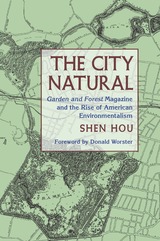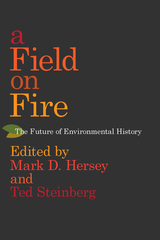
The weekly magazine Garden and Forest existed for only nine years (1888–1897). Yet, in that brief span, it brought to light many of the issues that would influence the future of American environmentalism. In The City Natural, Shen Hou presents the first “biography” of this important but largely overlooked vehicle for individuals with the common goal of preserving nature in American civilization.
As Hou’s study reveals, Garden and Forest was instrumental in redefining the fields of botany and horticulture, while also helping to shape the fledgling professions of landscape architecture and forestry. The publication actively called for reform in government policy, urban design, and future planning for the preservation and inclusion of nature in cities. It also attempted to shape public opinion on these issues through a democratic ideal that every citizen had the right (and need) to access nature. These notions would anticipate the conservation and “city beautiful” movements that followed in the early twentieth century.
Hou explains the social and environmental conditions that led to the rise of reform efforts, organizations, and publications such as Garden and Forest. She reveals the intellectual core and vision of the magazine as a proponent of the city natural movement that sought to relate nature and civilization through the arts and sciences. Garden and Forest was a staunch advocate of urban living made better through careful planning and design. As Hou shows, the publication also promoted forest management and preservation, not only as a natural resource but as an economic one. She also profiles the editors and contributors who set the magazine’s tone and follows their efforts to expand America’s environmental expertise.
Through the pages of Garden and Forest, the early period of environmentalism was especially fruitful and optimistic; many individuals joined forces for the benefit of humankind and helped lay the foundation for a coherent national movement. Shen Hou’s study gives Garden and Forest its due and adds an important new chapter to the early history of American environmentalism.

Inspired by the pioneering work of preeminent environmental historian Donald Worster, the contributors to A Field on Fire: The Future of Environmental History reflect on the past and future of this discipline. Featuring wide-ranging essays by leading environmental historians from the United States, Europe, and China, the collection challenges scholars to rethink some of their orthodoxies, inviting them to approach familiar stories from new angles, to integrate new methodologies, and to think creatively about the questions this field is well positioned to answer.
Worster’s groundbreaking research serves as the organizational framework for the collection. Editors Mark D. Hersey and Ted Steinberg have arranged the book into three sections corresponding to the primary concerns of Worster’s influential scholarship: the problem of natural limits, the transnational nature of environmental issues, and the question of method. Under the heading “Facing Limits,” five essays explore the inherent tensions between democracy, technology, capitalism, and the environment. The “Crossing Borders” section underscores the ways in which environmental history moves easily across national and disciplinary boundaries. Finally, “Doing Environmental History” invokes Worster’s work as an essayist by offering self-conscious reflections about the practice and purpose of environmental history.
The essays aim to provoke a discussion on the future of the field, pointing to untapped and underdeveloped avenues ripe for further exploration. A forward thinker like Worster presents bold challenges to a new generation of environmental historians on everything from capitalism and the Anthropocene to war and wilderness. This engaging volume includes a very special afterword by one of Worster’s oldest friends, the eminent intellectual historian Daniel Rodgers, who has known Worster for close to fifty years.
READERS
Browse our collection.
PUBLISHERS
See BiblioVault's publisher services.
STUDENT SERVICES
Files for college accessibility offices.
UChicago Accessibility Resources
home | accessibility | search | about | contact us
BiblioVault ® 2001 - 2024
The University of Chicago Press









